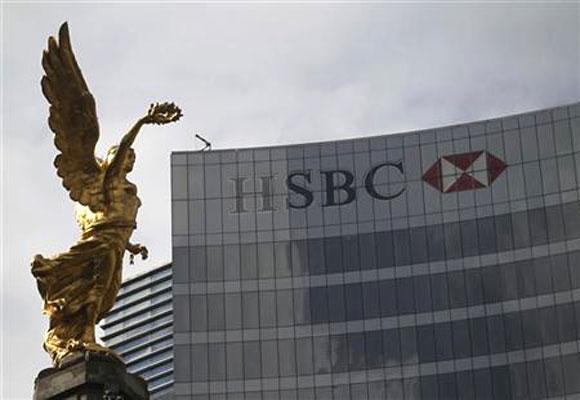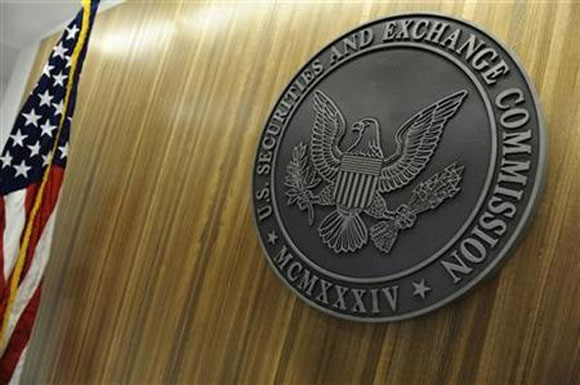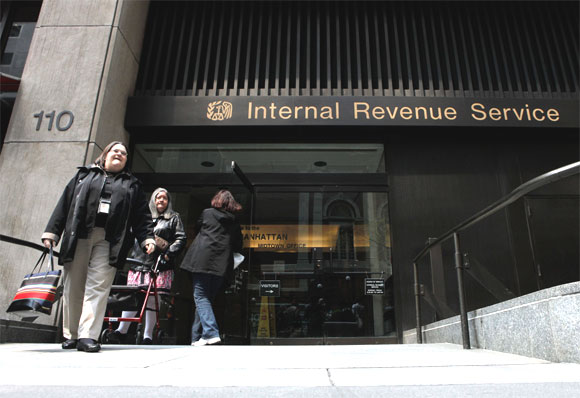Photographs: Edgard Garrido/Reuters
Global banking major HSBC has said it may face "significant" penalties from the US authorities with regard to an ongoing probe into suspected tax evasion by the US-based clients of its Indian unit, among other cases.
The US tax department is investigating possible evasion of federal income taxes by the American residents of Indian origin through use of their accounts with HSBC India.
HSBC said in a regulatory filing last night that it is cooperating with the US Department of Justice and the Internal Revenue System (IRS) in their probes into whether certain HSBC companies and employees acted appropriately in relation to certain customers with US tax reporting requirements.
The disclosure was made by UK-based HSBC as part of an update of the ongoing "regulatory and law enforcement investigations", along with the bank's first quarter results.
About the case involving its Indian unit, the banking giant said that HSBC Bank USA in April 2011 had received a 'John Doe' summons from the IRS, directing it to produce records with respect to US-based clients of an HSBC Group company in India.
"We have cooperated fully by providing responsive documents in our possession in the US to the IRS," it added.
Click on NEXT for more...
Tax evasion case: HSBC may face 'significant' penalty
Image: The seal of the US Securities and Exchange Commission hangs on the wall at SEC headquarters in Washington.Photographs: Jonathan Ernst/Reuters
In the US tax parlance, the 'John Doe' summons is one issued by the Internal Revenue Service to a third party to provide information on an unnamed, unknown taxpayer with potential tax liability. The unnamed person is addressed as 'Jon Doe' in such summons.
About another case, HSBC said it had also received in April 2011 a subpoena from the US markets regulator SEC, directing HSBC Bank USA to produce records related to HSBC Private Bank Suisse SA's cross-border policies and procedures and adherence to US broker-dealer and investment adviser rules and regulations when dealing with US resident clients.
"HSBC Bank USA continues to cooperate with SEC," it said. HSBC said that "based on the facts currently known in respect of each of these investigations, it is not practicable at this time for us to determine the terms on which these ongoing investigations will be resolved or the timing of such resolution or for us to estimate reliably the amounts, or range of possible amounts, of any fines and/or penalties.
"As matters progress, it is possible that any fines and/or penalties could be significant," HSBC added.
Click on NEXT for more...
Tax evasion case: HSBC may face 'significant' penalty
Image: Women walk out of an Internal Revenue Service office in New York.Photographs: Lucas Jackson/Reuters
Way back in 2011, the US Justice Department had said that the IRS was demanding from HSBC Bank USA about the US residents who may be using accounts at HSBC India "to evade federal income taxes".
Through the John Doe summons, IRS had asked HSBC USA to produce records identifying US taxpayers with accounts at HSBC India, many of whom were believed by the government to have hidden their accounts from the IRS.
The probe began after one Vaibhav Dahake was charged by the US authorities "with conspiracy to defraud the US by using undeclared accounts in the British Virgin Islands and at HSBC India to evade his income taxes".
As per the court documents filed by the government in that case, certain employees of HSBC Holdings plc and its affiliates operating in the US had assured Dahake that accounts maintained in India would not be reported to the IRS.
The government had further said HSBC India in 2002 opened a 'representative office' at an HSBC USA office in New York City to enable Non-Resident Indians (NRIs) living in the US to open accounts in India.
Click on NEXT for more...
Tax evasion case: HSBC may face 'significant' penalty
Photographs: Reuters
Later in 2007, HSBC India opened a second representative office at an HSBC USA office in California, purportedly "to make banking transactions more convenient for the NRI community based in California," as per the Justice Department documents.
Although HSBC India closed those offices in June 2010, the US government suspected that NRI clients might still access their accounts at HSBC India from the US.
The government had further told the court that "NRI clients have told IRS investigators that NRI representatives in the US assured the clients that they could invest in accounts at HSBC India without paying US income tax on interest earned on the accounts and that HSBC would not report the income earned on the HSBC India accounts to the IRS."
The federal law requires the US taxpayers to pay federal income taxes on all income earned worldwide, while the US taxpayers are also required to report all their foreign financial accounts if the total value of the accounts exceeded $10,000 at any time during a calendar year.
The US government is already in talks with its Indian counterpart with regard to an Inter-Government Agreement for implementation of its FATCA (Foreign Asset Tax Compliance Act), which would require the banks and other financial institutions operating in India to share details about their US-based clients including NRIs with the IRS.





article